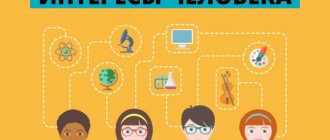What is personality
The concept of personality characterizes a person as a being endowed with consciousness, using it in the process of communication, intellectual activity, work, and interaction in society. A person has a unique character, exhibits an active life position, is aware of his actions and accepts responsibility for them.
There are no identical personalities, since each person has his own life experience, mental characteristics, congenital and acquired qualities. You might think that animals are also different from each other, but this does not make them individuals. After all, a person is a part of human society, performing certain functions in it, playing its roles.
Many people wonder at what age does a person become an individual? But there is no exact answer; everyone goes through this process individually, at their own time. We can talk about the beginning of personality formation if the child separates himself from the people around him and understands his place among family members and relatives. Then he begins to compare himself with his peers, other children. Thus, personality gradually develops from childhood.
This is interesting! Children under 1 year of age are not able to distinguish themselves in the mirror. They watch with interest the reflection that appears, but still cannot understand that it is themselves. Often the baby tries to look behind the back of the mirror, wanting to find another child there. But from 12-16 months, children already establish a connection between themselves and the emerging reflection. This is one of their first “steps” towards self-knowledge and development of themselves as individuals.
Personalities can be very different: positive and negative, developed and backward, sincere, mean, benevolent and others. It all depends on a set of individual qualities that are formed from early childhood.
The role of education in the formation of an individual moral imperative
Nurturing the basic qualities of a child’s personality in childhood and adolescence plays a vital role in his development as an individual. Very often, a child copies the behavior of his parents, and in adulthood projects their images onto the people around him. For this reason, parents must set the right, good example for their children.
According to the teachings of L. Kohlberg, the moral imperative is individual and is established through the passage of several stages:
- Pre-moral stage. The child's behavior during this period of time is determined by external factors. The opinions of the people around him do not matter to him. Nevertheless, the child obeys adults so as not to be punished. First stage. The child understands why he receives rewards and praise, and what he can be scolded for. All actions are determined exclusively by this model.
- Second stage. At this stage, the child orients behavior towards obtaining benefits. Learns to respond with evil to evil, and with good to good.
- Third stage. The child acts in such a way as to gain approval in the eyes of others. In this way he learns to do good deeds.
- Fifth stage. The assessment is based on a democratic attitude towards society, respect for people (all and in particular).
The passage of these stages in the formation of moral qualities of a person ends for all people at different ages. Often a person can get “stuck” at one of the early stages, not wanting to develop further.
Qualities inherent in personality
Personality is the totality of a person’s qualities. Each personality has its own unique set of qualities, there are a lot of them, sometimes one contradicts the other. So, a good-natured person may have greed in his character. He treats people around him well, but never lends money or gives expensive gifts.
Distinctive personality traits are:
- Worldview. This is a whole system of views on the world, ideas about it, values that can be realistic or illusory.
For example, a seven-year-old boy, Vasya, believes that all doctors are cruel and evil. He formed this opinion after Vasya suffered from a purulent sore throat. The doctor gave him injections for a whole week; a strong painful reaction was left in the boy’s memory for a long time.
But the worldview can change over time, so, having matured, Vasya will understand that he was mistaken about doctors in childhood.
- Character. Each person has a set of personal characteristics and qualities that determine his behavior. Character is closely related to emotionality, so excessive sensitivity can lead to touchiness, hot temper makes a person angry.
- Degree of responsibility . You can tell whether a person is serious or not by his actions. Individuals who are constantly late, fail to fulfill their obligations, promises, or refuse responsibilities are called irresponsible. A responsible person, on the contrary, strives to bring all matters to the end, keeps his word, and is responsible for his own actions. Such people are always respected and valued in society, they are entrusted with responsible tasks, and appointed to higher positions.
- Self-esteem. An individual can distinguish himself from the rest of society and evaluate his own activities, appearance, habits and other characteristics. Self-esteem is developed through the process of comparing yourself to others.
Self-esteem largely determines how society will accept a person and whether others will love him. You can notice how in the school class they tease narcissistic children who do not respect teachers and peers, considering themselves superior and much better than others. But guys with low self-esteem are also shunned; they often have few friends due to shyness and indecisiveness.
- Mental capacity . From birth, everyone has their own intellectual potential, that is, the ability to develop their minds. But a person can surpass his natural abilities thanks to perseverance, determination, and his work.
Example. Petya Ivanov has innate mathematical abilities. But he gets 4s and 3s because of laziness and unwillingness to do his homework. Sasha Sidorov is not good at mathematics, but he devotes a lot of time to extracurricular activities, and has already begun to earn his first A's.
If desired, a person can develop his memory, logical thinking, willpower and even physical abilities.
The qualities of a person’s personality are manifested and developed in the process of communication, interaction and work activity.
Sources
- van Riel MHC., Yu Z., Hodono S., Xia D., Chandarana H., Fujimoto K., Cloos MA. Free-breathing abdominal T1 mapping using an optimized MR fingerprinting sequence. // NMR Biomed - 2022 - Vol - NNULL - p.e4531; PMID:33902155
- Treese JS., Nolte I., Bach JP. Chronic enteropathy in dogs — retrospective case analysis and results of an owner survey. // Tierarztl Prax Ausg K Kleintiere Heimtiere - 2022 - Vol49 - N2 - p.94-103; PMID:33902118
- Hildebrandt N., Henrich E., Schneider M. [Echocardiographic measurements in clinically healthy ferrets without sedation]. // Tierarztl Prax Ausg K Kleintiere Heimtiere - 2022 - Vol49 - N2 - p.104-109; PMID:33902117
- Stark A., Cantrell S., Greenberg RG., Permar SR., Weimer KED. Long-term Outcomes after Postnatal Cytomegalovirus Infection in Low Birthweight Preterm Infants: A Systematic Review. // Pediatr Infect Dis J - 2022 - Vol - NNULL - p.; PMID:33902071
- Walentek P. Signaling Control of Mucociliary Epithelia: Stem Cells, Cell Fates, and the Plasticity of Cell Identity in Development and Disease. // Cells Tissues Organs - 2022 - Vol - NNULL - p.1-18; PMID:33902038
- Seki A., Saito K., Takemiya H. Current status of the environmental monitoring database on the accident at Fukushima Daiichi Nuclear power plant. // J Radiol Prot - 2022 - Vol - NNULL - p.; PMID:33902015
- Liu X., Wu W., Liu C., Yi W., Chen Q., Cui S. Preparation and mechanism research of Bio-inspired dopamine decorated Expanded Graphite/Silicone Rubber composite with high thermal conductivity and excellent insulation. // Nanotechnology - 2022 - Vol - NNULL - p.; PMID:33902011
- Beck W., Hora F., Pantchev N. Case series: Efficacy of a formulation containing selamectin and sarolaner against naturally acquired mite infestations (Demodex sp., Ornithonyssus bacoti) in degus (Octodon degus). // Vet Parasitol - 2022 - Vol293 - NNULL - p.109430; PMID:33901932
- Mahboub HH., Beheiry RR., Shahin SE., Behairy A., Khedr MHE., Ibrahim SM., Elshopakey GE., Daoush WM., Altohamy DE., Ismail TA., El-Houseiny W. Adsorptivity of mercury on magnetite nano-particles and their influences on growth, economical, hemato-biochemical, histological parameters and bioaccumulation in Nile tilapia (Oreochromis niloticus). // Aquat Toxicol - 2022 - Vol235 - NNULL - p.105828; PMID:33901865
- Cusumano D., Boldrini L., Yadav P., Yu G., Musurunu B., Chiloiro G., Piras A., Lenkowicz J., Placidi L., Romano A., De Luca V., Votta C., Barbaro B., Gambacorta MA., Bassetti MF., Yang Y., Indovina L., Valentini V. Delta radiomics for rectal cancer response prediction using low field magnetic resonance guided radiotherapy: an external validation. // Phys Med - 2022 - Vol84 - NNULL - p.186-191; PMID:33901863
Individual and individuality
An individual is a separate representative of the human race by virtue of his birth. The qualities of an individual are manifested in his appearance: eye shape, leg size, hair color, and so on. An individual has innate inclinations and abilities, but will become an individual only in the process of social development.
The concept of individuality is different from the concept of individual. Individuality is the characteristics of an individual, its uniqueness, originality. It includes intellectual, spiritual qualities and physical characteristics. Individuality manifests itself when a person makes choices, makes independent decisions, or engages in any activity.
The concept of individuality is inextricably linked with personality. The relationship between the concepts of individuality and personality is manifested in the fact that a person who is an individual will necessarily demonstrate his individuality in interaction with society.
Willpower is a character trait
The concept of “willpower” is quite often associated with forcing factors: a strict diet, quitting smoking, alcohol, being forced to read or study. It is extremely necessary and irreplaceable throughout human life and in all its spheres: sports, career, spiritual self-knowledge and development. Willpower really helps us focus our minds on achieving goals, forcing us to go without looking back and without stopping halfway to “take a break.”
Willpower needs to be constantly developed. A person with willpower boldly dictates to his mind and subconscious what he needs: what to imagine, what to focus on and how to think. In the absence of this skill, we turn into parents who love their child with blind, sick love: we allow any whim and thought to control us. How can we ensure that willpower constantly follows us as we grow, mature and age?
Strengthening willpower:
- Self-respect Respect yourself - if you decide something for yourself, do it, committing to go to the end. Don't change your mind and don't put it off until later.
- Freedom from habits Don't become a slave to habits. Don’t do things in the same way—be creative.
- Do what you least want to do. You need to force yourself to devote time and energy to what you don’t want to do, remembering that only our laziness and lack of self-confidence prevent us from completing this or that task.
- More is better Do more than you planned: read 5 pages more, periodically increase your walking distance, clean a larger area than you planned.
Failure is always a new starting point. Start again and again. Strong, self-confident people are not deterred by defeat. The end of the old is always the beginning of the new.
How and in what environment personality is formed
Personality is formed in the process of interaction with other people: parents, family, friends, teachers, work colleagues and others. The process of personality formation is long and complex, impossible without socialization. Socialization is the individual’s acquisition of values, rules of behavior and norms accepted by society.
Socialization begins in early childhood, when parents teach their children by example and educate them. While reading a fairy tale, the mother explains to the baby which heroes are bad, what good and evil are, and what a good person should do. Gradually, the child develops basic standards of morality, ethics, the concept of what is good and what is bad.
Socialization continues with entry into school. There, the child is influenced by teachers, classmates, and school administration. Gradually, a person’s social circle expands, he establishes contact with a large number of people. Socialization continues throughout life, that is, personality formation is a continuous process.
This means that personality changes over time, character or individual qualities change, and new physical and intellectual characteristics appear. Thanks to the knowledge of personality characteristics at each age, an entire science was created - Developmental Psychology. This does not mean that at a certain age people become the same, but they exhibit common features and qualities characteristic of a given age.
Example. It can be noted that adolescents in adolescence exhibit common character traits: hot temper, stubbornness, and susceptibility to the influence of peers. Old people exhibit other characteristics: slowness, constant worry about their well-being.
The influence of society on personality
Personality and social environment are inextricably linked. Its future depends on the environment in which a personality is formed. Seeing bad examples and irresponsible behavior in front of him, the child perceives this as a model. After some time, he may begin to behave the same way as his friends and people close to him. He may start drinking, smoking, stealing, without knowing that such behavior is the result of formed views on the world, the bad influence of his immediate environment.
Sometimes a person can fall under the bad influence of the social environment despite his desire. A schoolboy begins to smoke, fearing the ridicule of his classmates, who have long been addicted to cigarettes. A teenager decides to steal because of his friends’ obsessive persuasion to get easy money. An employee deceives his superiors after much persuasion from his colleague.
The positive influence of the environment on personality development is also manifested. Seeing before him examples of successful, happy and respected people, the child strives to imitate them and copy their behavior. Therefore, at school a lot of time is devoted to studying the biographies of national heroes, patriots, and outstanding personalities. A good example becomes an inspiration for work, creative activity, and activity in society.
Different structures of society have varying degrees of influence on the individual.
- Parents and close relatives have the greatest influence when raising a child from infancy.
- Second in terms of influence are school teachers.
- They are followed by friends, acquaintances, colleagues.
- The media play an important role (mass media: Internet, television, print media).
In addition, the individual is influenced by the socio-cultural environment characteristic of the state and the area in which he lives. So in Russia, the USA, India, Israel - the conditions for the formation of a personality are significantly different. Thanks to this, individual peoples and the population of different countries have their own distinctive character traits and individual characteristics.
Research confirms
More rigorous evidence comes from studies using the twin method. The mental performance of identical twins and pairs of brothers and sisters were compared with each other. The correlation of indicators within identical pairs turned out to be very high; among brothers and sisters it was significantly lower.
The results of animal studies using the method of artificial selection demonstrated the possibility of accumulation of genetic predisposition to successful learning.
The impact of the individual on society
The role of the individual in the development of society is also high. Let's look at an example of how a person influences society:
- A.V. Suvorov is a famous Russian commander, enjoyed great respect among the soldiers. He managed to win many battles in which the enemy army was several times larger than the Russian one. The soldiers loved and respected Suvorov so much that they went into any battle without fear, under his leadership. Thus, thanks to the personal qualities of a military leader, Russia won victories in many wars.
- The famous inventor Henry Ford created an assembly line production of cars, thanks to which the car became an affordable means of transportation for many Americans.
- Nicolaus Copernicus was the first to reject the idea that the Earth is stationary, suggesting that it rotates around the Sun and on its own axis. His works subsequently led to many different discoveries.
Thus, the influence of the individual on society and society on the individual are interconnected.











